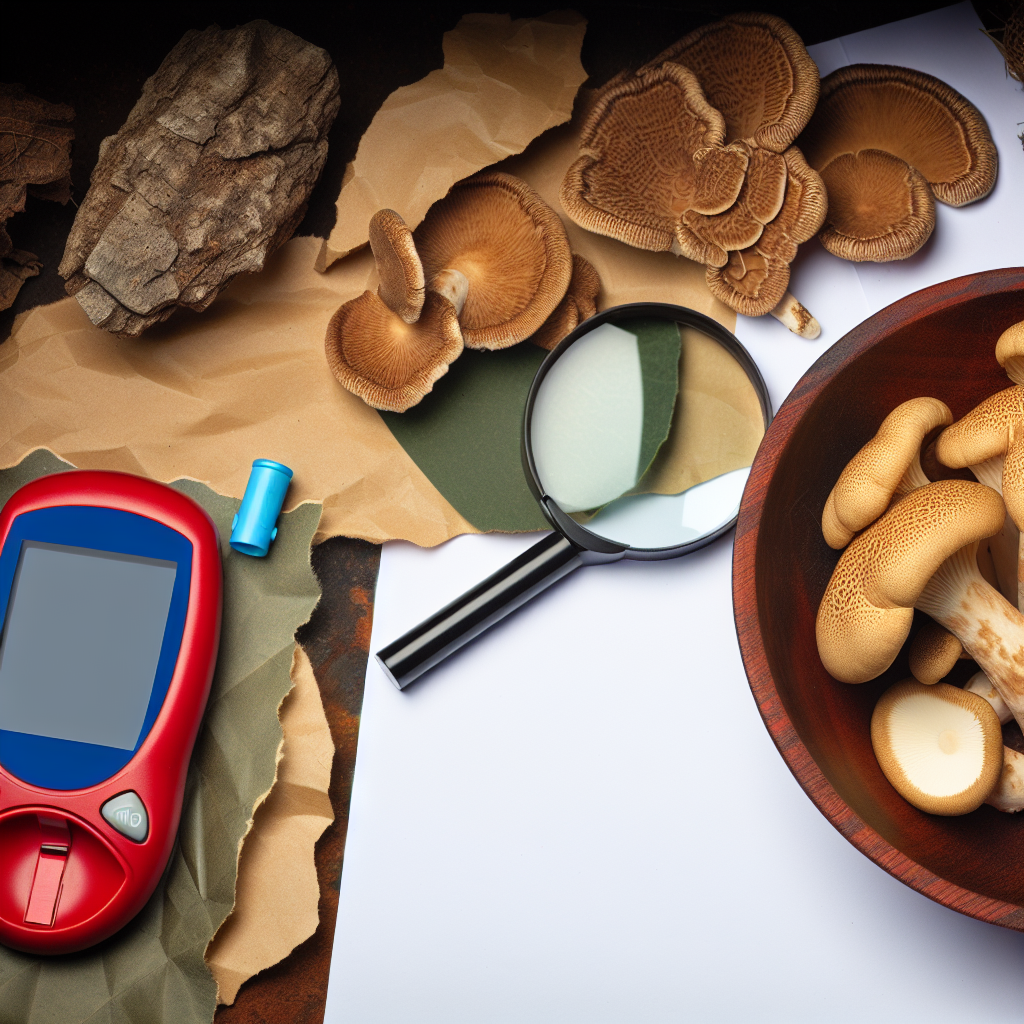# Maitake Mushroom for Blood Sugar Balance: Latest Studies
Mushrooms have long been prized for their nutritional and medicinal properties. Among them, the maitake mushroom (Grifola frondosa), also known as the “dancing mushroom” or “hen of the woods,” has gained significant attention in both traditional and modern medicine. Native to the mountains of Japan and North America, maitake has been a cornerstone of Eastern herbal remedies. Recently, however, emerging studies are highlighting its potential in managing one of today’s most prevalent health challenges: blood sugar balance.
Breakthrough Research: Maitake Mushroom Shows Promise in Blood Sugar Control
In recent years, a growing body of research has explored the anti-diabetic and blood sugar-regulating effects of maitake mushrooms. One of the most compelling compounds is the Maitake D-fraction, a bioactive beta-glucan known for its immunomodulatory and glucose-lowering effects.
A 2013 study published in the *Journal of Medicinal Food* investigated the effects of maitake mushroom extracts on insulin resistance. The researchers administered maitake polysaccharides to mice that had been induced with type 2 diabetes. They found significant reductions in fasting blood glucose levels, improved glucose tolerance, and enhanced insulin sensitivity in the mice treated with maitake extract compared to the control group. [Read abstract](https://pubmed.ncbi.nlm.nih.gov/23470107/)
In another study from 2015 published in the *International Journal of Molecular Sciences*, researchers examined the hypoglycemic activity of a specific fraction from the Grifola frondosa mycelium. The results demonstrated that the fraction significantly reduced blood sugar levels in diabetic rats and improved pancreatic beta-cell function—a crucial factor for insulin production. [Read study](https://www.mdpi.com/1422-0067/16/11/27720)
Human Trials: Maitake Extracts Reduce HbA1c in Type 2 Diabetes
Human trials, though still limited, have also provided encouraging insights. A small-scale study in Japan evaluated the effects of Maitake D-fraction in patients with type 2 diabetes over an eight-week period. Participants who consumed maitake extracts daily experienced consistent reductions in HbA1c levels, suggesting better long-term glycemic control.
These findings suggest that maitake may serve as a valuable adjunct therapy for diabetes management, particularly when paired with lifestyle changes like a balanced diet, regular exercise, and stress reduction.
How Maitake Works: The Science of Blood Sugar Reduction
Mechanistically, maitake mushrooms exert their blood sugar-lowering effects through multiple pathways:
– Insulin Receptor Modulation: Maitake enhances the activity of insulin receptors, making cells more responsive to insulin.
– GLUT4 Activation: It promotes the movement of glucose transporter type 4 (GLUT4) to the cell membrane, which helps transport glucose from the bloodstream into cells.
– Alpha-Glucosidase Inhibition: Maitake contains enzymes that inhibit carbohydrate breakdown, slowing digestion and reducing glycemic spikes.
– Pancreatic Beta-Cell Support: Certain fractions stimulate insulin production by protecting and strengthening beta-cell function in the pancreas.
These processes mirror some pharmaceutical approaches but are derived from a natural source with fewer reported side effects.
Adaptogenic Benefits: Supporting the Body’s Stress and Sugar Response
Maitake is not only a blood sugar modulator—it also acts as an adaptogen. This means it helps the body deal with various forms of stress. Since chronic stress can lead to excessive cortisol levels, which in turn increase blood glucose, maitake may indirectly improve blood sugar control by supporting adrenal health and hormonal balance.
This adaptogenic support is especially important in today’s fast-paced, high-stress lifestyles where blood sugar spikes are often tied to emotional and physical stressors.
A Functional Food for the Future: Integrating Maitake into Wellness Plans
As interest in natural therapies and functional foods grows, maitake mushrooms are becoming a research focal point for their role in chronic disease prevention and metabolic support. Although more large-scale human clinical trials are necessary, the current data highlights the potential of maitake to play a frontline role in natural blood sugar regulation—either as a supplement or as a regular part of the diet.
Cooking with maitake, using powdered mushroom extracts, or taking capsules standardized for D-fraction content are all methods of incorporating this helpful fungus into your health plan.
Conclusion: Nature Meets Science in Maitake’s Potential to Balance Blood Sugar
Maitake mushrooms are emerging as a potent natural ally in the fight against blood sugar imbalances. With growing scientific support for their hypoglycemic and insulin-sensitizing properties, they offer a promising adjunct or alternative to conventional therapies. While maitake should not replace prescribed diabetes medications, incorporating this functional fungus into a comprehensive wellness plan may provide enhanced blood sugar control and overall metabolic health.
As always, consult a healthcare provider before starting any new supplement routine—especially if you’re currently managing chronic health conditions or taking prescription medications.
References
– *Journal of Medicinal Food* – [Hypoglycemic Effects of Maitake Extract in Diabetic Mice](https://pubmed.ncbi.nlm.nih.gov/23470107/)
– *International Journal of Molecular Sciences* – [Maitake Mycelium Fraction Improves Pancreatic Function](https://www.mdpi.com/1422-0067/16/11/27720)
– *Frontiers in Pharmacology* – [Maitake Polysaccharides Improve Insulin Sensitivity via GLUT4 Activation](https://www.frontiersin.org/articles/10.3389/fphar.2019.00193/full)
– *National Institutes of Health (NIH)* – [Herbal Medicine: Biomolecular and Clinical Aspects – Maitake Overview](https://www.ncbi.nlm.nih.gov/books/NBK92758/)
Concise Summary:
Maitake mushrooms are emerging as a promising natural solution for blood sugar regulation. Recent studies have shown that compounds in maitake, such as the Maitake D-fraction, can improve insulin sensitivity, support pancreatic function, and lower blood glucose levels in both animal and human trials. By incorporating maitake into a comprehensive wellness plan, individuals may be able to enhance their blood sugar control and overall metabolic health.

Dominic E. is a passionate filmmaker navigating the exciting intersection of art and science. By day, he delves into the complexities of the human body as a full-time medical writer, meticulously translating intricate medical concepts into accessible and engaging narratives. By night, he explores the boundless realm of cinematic storytelling, crafting narratives that evoke emotion and challenge perspectives. Film Student and Full-time Medical Writer for ContentVendor.com



